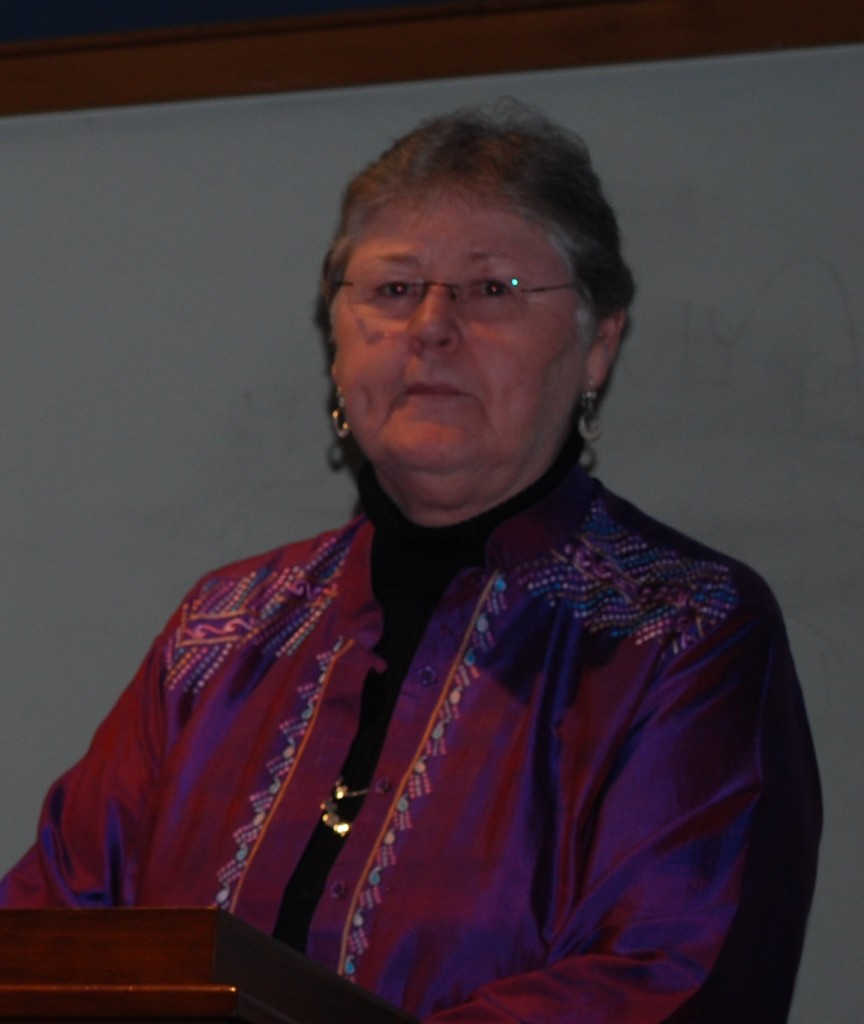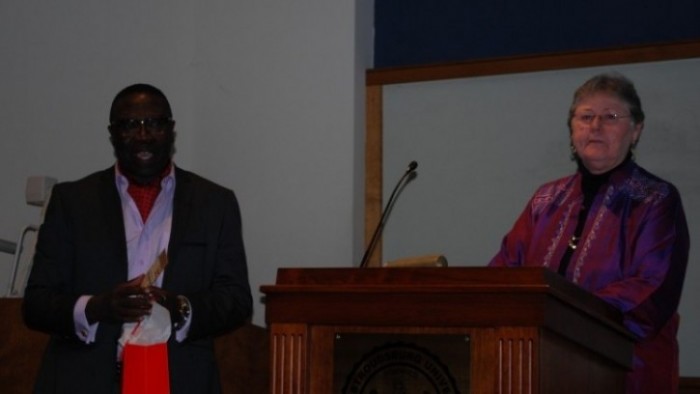

Photo Credit / Ronald Hanaki
BY RONALD HANAKI
SC Staff Writer
On March 6, Mary Ellen McNish, East Stroudsburg University Class of 1968, returned to ESU’s Beers Lecture Hall to deliver a talk about the work she is doing as the president and CEO of The Hunger Project.
The Hunger Project is a non-profit organization whose mission is “to end hunger and poverty by pioneering sustainable, grass roots, women-centered strategies and advocating for their widespread adoption in countries throughout the world.”
McNish’s presentation discussed empowering people, especially women, and the importance of reaching out to disenfranchised people with the goal of improving people’s lives.
The talk was organized by ESU political science professor Dr. Samuel Quainoo and ESU’s political science department.
Students at ESU may already be familiar with McNish because last year, she invited three ESU students to attend the thirteenth World Summit of Nobel Peace Prize Laureates.
The summit discusses the political and social conflicts of the day.
The next summit will be held in Cape Town, South Africa, and will be hosted by former South African President F.W. de Klerk. McNish will extend an invitation to ESU students again to attend that summit later in October.
McNish began her presentation by talking about her extensive biography.
McNish served as the general secretary of the American Friends Service Committee (AFSC).
AFSC was founded in 1917 originally as an organization to help victims of the First World War. Later, its scope was expanded to work on behalf of peace and social justice around the world.
In her capacity there, McNish created the organization’s first strategic plan and led peace delegations to North Korea, China, Palestine, Brazil, and seven African countries.
McNish also brings with her seven years of progressive business experience with non-profit organizations.
She has been with the Weill Cornell Medical College and was the executive vice-president of Planned Parenthood in Maryland. She has also been a schoolteacher and has worked at the Young Women’s Catholic Association (YWCA) in Camden, New Jersey.
McNish is a Scranton native who did her undergraduate work in education and has a master’s degree in business from Johns Hopkins University. Later, she was awarded an honorary degree from Elizabethtown College.
She told the audience that she made enduring friendships at ESU, and she still gets together with her college friends every three or four years.
McNish credits the Intercollegiate Conference on Government, a model parliament, with giving her an opportunity to engage with other students as an undergraduate.
McNish was an education major at ESU and wanted to be teacher, but after teaching for a few years, she decided that teaching was not for her.
McNish then got involved as a community organizer with Head Start and later the YWCA in Camden, New Jersey.
The YWCA had spousal abuse programs and served as a shelter for battered women, and it was this experience that led her down the path of social and political advocacy.
McNish said, “Advocacy is important. If you can change the cause of the problem, you can go further.”
McNish became a Quaker and joined the AFSC.
As the executive head of AFSC, McNish was invited to Nobel Peace summit meetings organized by Mikhail Gorbachev and F.W. DeKlerk. She even made presentations on a panel with them and got to sit next to them at dinner.
McNish told the audience of a memorable moment in November 2001 when she was serving on a panel with the Dalai Lama.
After her presentation, the Dalai Lama faced her and put his hands together and bowed. She was so shocked that it happened that she fell off the dais.
McNish eventually reconnected with ESU through Michelle Benfer at ESU’s Foundation and meet ESU’s Dr. Quainoo.
Eventually, McNish moved on to become the president and CEO of The Hunger Project (THP).
THP’s mission is to end hunger and poverty, and through their efforts, McNish believes that world hunger will be over by the year 2030.
In advance of International Women’s Day on March 8, McNish cited that women made 59 cents for every dollar in 1968. Now, women make 77 cents for every dollar, so that is progress that can be celebrated during women’s history month.
McNish then went on to share a number of statistics with the audience.
In many African countries, women comprise 60% to 80% of the labor that produces food, yet less than 2% of women own the land that produces that food.
There are only two women presidents in Africa. They are Liberia’s Ellen Johnson Sirleaf and Malawai’s Joyce Banda, and McNish has met them both.
Although hunger is a global problem, The Hunger Project does not work inside the United States.
McNish said that 8,500 children die of hunger per day, so hunger occurs globally on a different scale than in the United States. Moreover, the focus of The Hunger Project is primarily women.
The Hunger Project works by setting up a vision, commitment, and action workshop. THP asks a village or community, “What do you want to do?” The village or community is then divided into committees that work together to find out what they want to do.
Next, an epicenter or a building is created. Typically, THP stays with a village for some 8 to 10 years, but the mind-set shift to empower previously disenfranchised women is something that takes generations to change.
There is a micro-finance program that establishes a chartered bank, and women are taught how to handle money. Then businesses are started, and in time, the community becomes self-sustaining.
The Hunger Project has worked in 8 different countries including India, Bangladesh, Mexico, and Peru. The next country is Liberia..
The Hunger Project’s operational costs are 100% funded by donations, and they need to raise 20 million dollars every year. So fund-raising is a challenge for them.
Toward the end of her presentation, McNish talked about a non-profit youth movement working to end global hunger by 2030 called FeelGood that claims to be “ending world hunger, one grilled cheese at a time.”
FeelGood has over twenty chapters on college campuses across the United States and hosts cheese seminars where members educate students about hunger. Every year, FeelGood donates $100,000 to The Hunger Project, and McNish is very appreciative and thankful for their efforts.
Email Ronald at:
rhanaki@live.esu.edu

